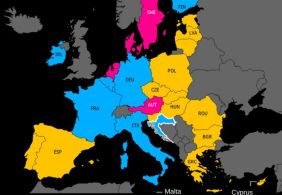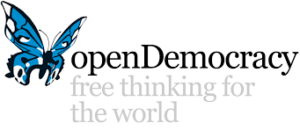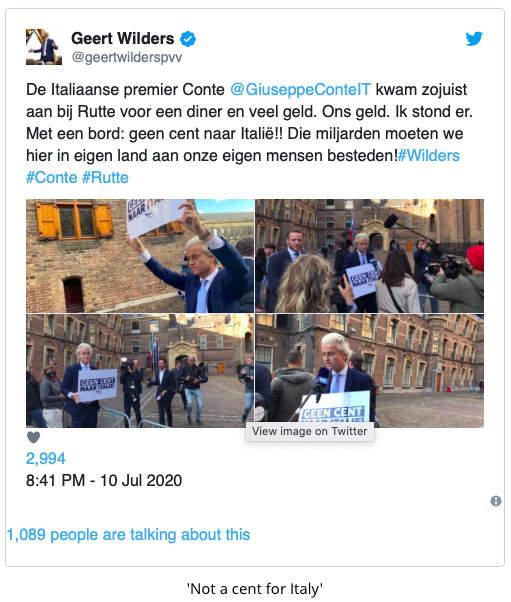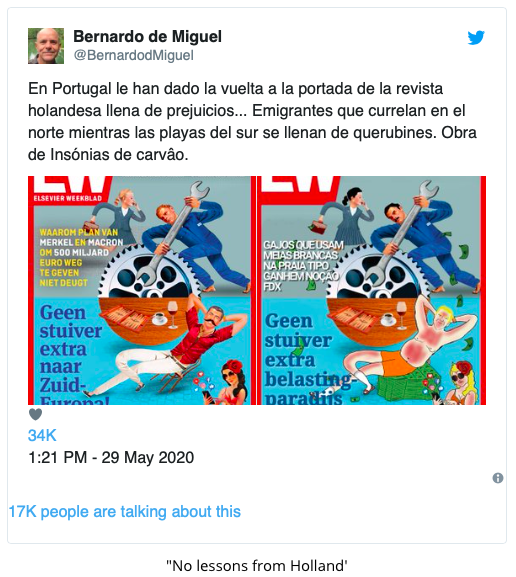When EU leaders discuss the coronavirus Recovery Fund at the upcoming meeting of the European Council on Friday, some persistent European stereotypes will accompany negotiations.
The on-going debates regarding the coronavirus Recovery Fund that will form the focus of discussions at the upcoming EU summit on July 17 have highlighted the pernicious persistence of national stereotypes that continue to afflict political positioning and decision-making within the Union.
It would be easy to dismiss such stereotypes as simply an easy short-hand adopted by politicians to position themselves and others within EU political debates on matters regarding everything from migration quotas to budgetary questions. Self- and other- stereotypes also play very well to domestic audiences, providing an easy set of representations on which to draw when arguing for the national position both vis a vis Brussels or other EU member states.
The self-ascribed moniker ‘the frugal four’ adopted by Austria, Denmark, the Netherlands and Sweden is no exception. Intended to mark out these countries’ opposition to ‘irresponsible’ and ‘excessive’ spending of the proposed EU-wide Recovery Fund, it speaks to a ‘moral’ as well as economic positioning.
Indeed, the term ‘moral hazard’ that was wielded by Dutch politicians in 2012 when a previous proposal for mutualizing European debt was floated has once more appeared on the scene – today, as then, tied to a distinct geographical imagination of hazard, irresponsibility, and excess. We need to take such monikers seriously, for in this moment of common crisis they tell us much not just about radically different views in different EU countries regarding the role and responsibilities of the national state towards its citizenry, but also radically different views regarding responsibilities to Europe and fellow Europeans.
Moral geographies
The most striking example of a ‘clash of stereotypes’ is certainly offered by Italy and the Netherlands. In the past months, Dutch PM Mark Rutte has taken on the role of the most vocal leader of the ‘frugal four’, threatening to block recovery funding to Italy and other (mostly southern European) states if these do not undertake a comprehensive package of reforms.
With this positioning Rutte and his Finance Minister Wopke Hoekstra maintain a long-standing self-representation of the Netherlands’ position in the EU as an economically ‘thrifty’ if not directly self-serving actor: ‘effective without empathy’, as the leading government think tank Clingendael described perceptions of Dutch interest promotion within the EU in a report published in the spring of 2019.
Beyond re-playing long-standing self-stereotypes within EU institutions, however, Rutte is also playing to a home audience, conscious of the parliamentary elections that await him in the coming year. When Italian PM Giuseppe Conte arrived in The Hague this past week for a meeting with Rutte, he was greeted outside of the Parliament by far-right leader Geert Wilders, holding up a sign reading: ‘Not a cent for Italy’.
Wilders may represent the extreme wing of Dutch nationalist politics, but the same slogan featured just a month earlier on the front cover of Dutch popular weekly Elsevier Weekblad, accompanied by an illustration that summed up the competing stereotypes: at the top, two industrious Dutch workers, below, two supposed Mediterranean types, lounging in the sun.
The cover caused popular outrage in Italy – though curiously it was Giorgia Meloni, the leader of the right-nationalist Fratelli d’Italia party, allied with Wilders for the 2019 European Parliament elections, that filed a formal complaint, demanding that the government exact an immediate apology from the Dutch ambassador to Rome. ‘The cover is repugnant’ she noted, depicting Italians and other Mediterraneans as ‘parasites’. ‘We don’t accept lessons from Holland which has created a tax haven in Europe and is draining resources from all other Member States’, she added.[i]
There were also immediate reactions from other southern European opinion makers, many in jest, with a Portuguese re-working of the image to depict fat and sun-burned Northern European tourists lounging at the bottom of the image instead, in this tweet from El Pais Brussels correspondent Bernardo de Miguel:
Belgian MEP and chair of the Alliance of Liberals and Democrats for Europe, Guy Verhofstadt, was even stronger in his criticisms: ‘This sort of false reporting led to Brexit’, he tweeted, noting that under the terms of the plan ‘not 1 NL citizen will pay 1 euro more to the Covid Recovery Fund’. Elsevier Weekblad simply discounted the protests with a headline noting “Neo-Fascist Fratelli d’Italia demands apologies”.
The still-authoritarian South
Notwithstanding the accurate descriptor (Fratelli d’Italia is, indeed, the direct heir to the ‘post’ Fascist Alleanza Nazionale party), the choice of terminology also offered the Dutch weekly yet another easy stereotype: the Southern European authoritarian, if not directly (ex)Fascist.
Along with the spendthrift image, the stereotype of the (still) authoritarian Southern Europeans (whether Italian, Spanish or Greek) was indeed another powerful trope circulating all through the months of the lockdown. And not even a particularly implicit one: in his weekly televised addresses to Dutch citizens in the early weeks of the Netherlands’ so-called ‘intelligent lockdown’, PM Rutte insisted on the differences in ‘national character’ that would make the sort of harsh measures adopted in Southern European countries impossible in the Netherlands, since Dutch citizens would simply not accept the sort of limitations on their personal freedoms imposed in Italy and Spain.
Dutch citizens would simply not accept the sort of limitations on their personal freedoms imposed in Italy and Spain.
The choice to adopt only a very limited set of restrictions was a risky one, and indeed in the first months of the ‘intelligent lockdown’ the Netherlands had one of the highest mortality rates from the virus in Europe. The government position also initially insisted on the need to ‘build up population immunity’, though with the rapid debunking of the UK’s ‘herd immunity’ approach, that notion was ‘rapidly repackaged as a useful by-product rather than the main goal’, as Anna Holligan writing for BBC News noted in her report on the scientifically-questionable Dutch strategy. The country also had one of the lowest Covid-19 testing rates in Europe, and it was not until the start of June that testing became available to the general population: a convenient way of ‘keeping the numbers down’.
In justifying the limited range of restrictions – as too the limited state intervention into public health measures – Rutte repeatedly described the Netherlands in his weekly addresses as a ‘grown-up country’. As he noted in one speech, ‘what I hear around me, is that people are glad that they are treated as adults, not as children’. The implication was that the Dutch did not need to be treated like children ‘to behave responsibly’, unlike other European citizenries.
It was not until the start of June that testing became available to the general population: a convenient way of ‘keeping the numbers down’.
Irresponsible children
The paternalism at work in such imagined geographies of Europe is, again, not new, with very similar imaginations at play during and following the 2008 financial crisis which had profoundly unequal consequences across the European space.
As Greek economic geographer Costis Hadjimichalis has argued, to properly understand the geographies of uneven development in the EU, we need to appreciate their founding ‘economic mythologies’, that continue to frame to this day popular imaginations of political-economic choices and outcomes in Europe’s North and South.[i] Disparaging geographical metaphors like ‘Club Med’ or the infamous ‘PIIGS’ (Portugal, Italy, Ireland, Greece and Spain) were an evident example of this in the post-2008 years.
The tropes of childishness and irresponsibility applied to Southern European countries like Italy, Spain and Greece today thus draw on a much-longer standing set of imaginations, tracing a direct line of continuity from the financial crisis to the Covid-19 crisis. So too do the prescriptions offered: self-reliance and individual responsibility, the hallmarks of neoliberal capitalism.
‘Italians must learn to make it on their own’
In a front-page interview on the Italian newspaper Corriere della Sera in the first week of July, Dutch PM Rutte outlined his country’s position on the Recovery Fund. ‘Dear Italy, learn to make it on your own’ the headline announced.[ii] In the interview (the first given by Rutte to an international newspaper since the start of the pandemic) the PM was direct in his assessment: European solidarity at this moment was important, of course, but so too was ‘national responsibility’. ‘This means that Member States that require and request assistance right now must do what is necessary to be able to face a future crisis of this sort on their own, in resilient fashion’, Rutte noted.
The prescription? ‘Measures that will not be popular’, including ‘reforms that should increase the productivity and competitiveness of Italy’ and the ‘sustainability of public finances’, along with ‘promoting fiscal integrity and transparency’. The irony of the head of the EU state widely considered to be one of the least transparent as a corporate tax haven calling for more ‘fiscal integrity and transparency’ was not lost on the Corriere interviewer: an accusation immediately rejected by Rutte stating that ‘ours is an open economy’, that needs to ‘protect its tax base’.
It is not just a question of competing economic visions that is at play here, however. As Alexander de Croo, Belgium’s Deputy Prime Minister and Minister of Finance wrote in an editorial published on politico.eu in mid-June, the battle over the Recovery Fund was not simply an economic one, regarding whether or not to create debt: it was ‘an existential one’.
It was nothing less than a battle for the future of the European project. As de Croo wrote, ‘it was time ‘to break free from the narrative of the ‘lazy’ south and the ‘hard-working’ north’, since ‘when it comes to the economic impact of the coronavirus we are all in the same boat’. De Croo’s words were echoed just last week by Angela Merkel in the extended interviewshe gave to a group of European newspapers, as Germany took up the rotating presidency of the European Council on July 1.
It is a much broader, yes, ‘existential’ question, regarding what Europe is ‘for’.
In discussing the proposals for the Recovery Fund, Merkel rejected the question that the proposal for the Fund was a ‘major concession to the southern countries’. As she replied, ‘I don’t find it helpful to talk about thenorthern countries, the southern countries and the eastern Europeans. That is seeing things in black and white. I expect each of us always to put ourselves in the other person’s shoes and consider problems from the other’s point of view’. Keeping in mind ‘the huge burden in economic, medical and, of course, because of the many lives lost, emotional terms’ faced by countries like Italy and Spain, it was ‘only right for Germany to think not just about itself but to be prepared to engage in an extraordinary act of solidarity’.
The Recovery Fund proposal, originally advanced by Merkel and French President Emmanuel Macron, is indeed about much more than keeping the EU economy afloat. It is a much broader, yes, ‘existential’ question, regarding what Europe is ‘for’. And, as with all existential questions, the symbols, metaphors and stereotypes that inscribe it matter greatly. Is the EU simply little more than a free-trade area, where every state can advance its own particular interests (if need be, also at a cost to others)? Or should it also be an autonomous and supranational political actor, able to make, collectively, fully ‘political’ choices? In a moment in which the well-being of all Europeans is at stake, the choices made at Friday’s summit will have much wider consequences.
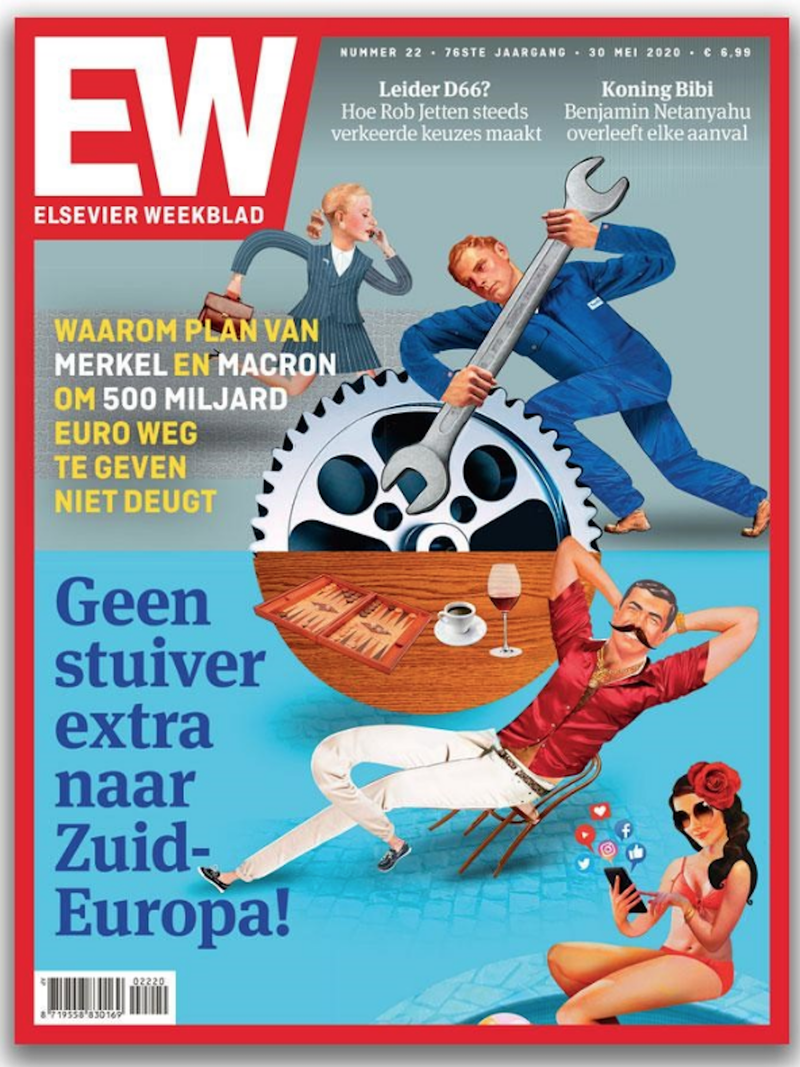
[i] Just days after the publication of the unfortunate cover story, the European Tax Justice Network published a calculation – widely reported in Italy – on how many millions of euros the Dutch state was ‘stealing’ from Italian state coffers by offering multinational companies (including Italian ones like car maker FIAT) a tax haven in the Netherlands. The report remarked on how ‘the EU countries with the highest reported cases of Covid-19 have been the biggest historical losers of corporate tax to the Netherlands, which is currently a leading opponent of solidarity measures proposed by the EU’.
[ii] Costis Hadjimichalis (2011). ‘Uneven geographical development and socio-spatial justice and solidarity: European regions after the 2009 financial crisis’. European Urban and Regional Studies 18(3):254-274.
[iii] Paolo Valentino (2020). ‘Cara Italia, impara a farcela da sola’. Corriere della Sera Weekly Newsmagazine ‘7’, July 3rd, 14-19.
